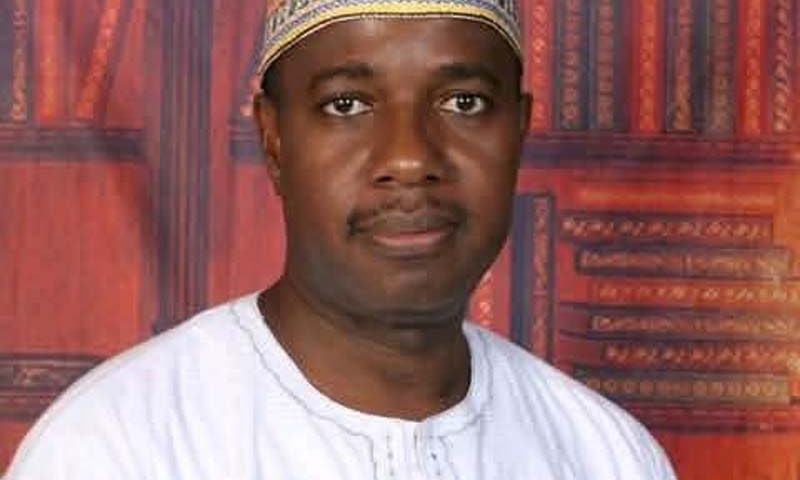“We know that one of the ways certain brain disorders (including some brain tumors) show up is increased religiosity” – Prof. Akinyemi, neuroscientist
Professor Rufus Akinyemi of the Neuroscience and Ageing Research Unit of the Institute for Advanced Medical Research and Training, College of Medicine, University of Ibadan, is also a consultant neurologist to the University College Hospital (UCH), Ibadan. In this interview by SADE OGUNTOLA, he says that dementia is more than memory loss; without treatment, it can cause a total change in the personality of affected individuals.
He speaks on other neurological issues, too.
IT is said that younger black women are increasingly presenting with memory loss. It is also said that dementia is a new phenomenon in black women. How true are these statements?
Dementia is a neurological disorder that arises when a person losses capacity for normal cognitive functions and the situation is bad enough that it affects the person’s ability to carry out normal daily activities independently. Cognition encompasses higher mental functions which include attention, memory – remembering things, taking in, processing, storing and recalling information; planning and making decisions/ judgments; use of language and recognising one’s location. All these are different domains of cognitive functions.
A person can have cognitive impairment without dementia if the person is still able to cope with daily life activities. We call this mild cognitive impairment. It is only when it gets so bad that the person is unable to cope with independent performance of daily activities either at home or at work that that person is said to have dementia.
Dementia is a global problem; it is not just a Nigerian problem. About 55 million people live with dementia globally, and it has been projected that by 2050, this number will grow to almost 150 million people.
What is most worrisome is that the largest proportion of people living with dementia currently and in coming years is in low- and medium-income countries (LMICs). A recent publication from the Global Burden of Disease Study that forecasted the future burden of dementia suggests that by 2050, 71 percent of the increase in the number of dementia in low and medium-countries will be in Africa.
So, it is a pandemic that is coming, and Africa will be at the centre of it unless we do something very drastic to reduce the risk at both individual and population levels.
Now, talking about dementia and women, it is known from studies down the ages that women tend to be at a higher risk of dementia generally, even globally. Why is it that, traditionally, women seem to be at a higher risk of dementia? Women live longer than men generally, and dementia is a disease of ageing. The older a person lives, the higher the risk of coming down with dementia.
So, if women live longer than men generally, that means that they generally have a higher risk. Another point is that the biological changes in women as they go through different phases of life, such as hormonal changes and menopause, might be predisposing them to dementia more than men.
Now, research has also detected differences in the bioenergetics of the brains of men and women. In other words, there are sex differences in the energy generation and utilisation of the brain. This has been suggested as also contributing to why women have a higher risk of dementia than men.
When we say black women, we need to decipher a number of things. Are we talking about black women in North America or black women in general? Why do I say so? We know that, generally, when you talk about blacks in the United States, they tend to have a higher risk of dementia compared to whites in the US. But when you compare blacks in Africa with those in the US, from the work done in the Ibadan-Indianapolis research project, it was discovered that blacks in Ibadan, that is, the Yoruba in Ibadan, had a lower risk for dementia compared to black Americans in Indianapolis, USA.
So, it means that if you compare black people in America with white people, they have a higher risk of dementia. When you compare black people in Africa to black people in America, the risk of dementia is lower. This is a result of differences in lifestyle, the environment, and the kind of food that we eat. The indigenous blacks in Africa tend to be more physically active, and our diet is different.
We eat less fatty/oily food, more carbohydrates with fresh vegetables and spices. But black Americans tend to eat a lot of fatty foods, cheese, processed foods, and so on. There is also the higher risk of cardiometabolic risks like hypertension and diabetes among the African Americans. All these may account for the higher burden of dementia among blacks in America (African Americans) compared to indigenous Africans.
Does loss of memory translate to dementia in all cases?
Not every loss of memory is due to dementia. The truth is that every human being is entitled to forgetting things one time or another. You may forget things because you’re either not concentrating or you have too much on your plate that you are grappling with. So, every human being is entitled to some degree of forgetfulness. But when the forgetfulness gets worse over time or becomes associated with other cognitive function abnormalities, we say the person has cognitive impairment or dementia if it’s so bad that functional independence is lost. So, not all memory loss is dementia. Forgetting things does not mean that automatically the person has dementia.
What are the conditions associated with memory loss?
Well, memory loss may be associated with dementia primarily, but memory loss could also be picked up even in people who are depressed. If a person is depressed, they may not be able to concentrate. You could be talking to him or her, but his/her mind is somewhere else. So, if he does not register the information, then there is nothing to retrieve. We describe this as pseudo-dementia of depression, meaning that it looks like dementia but is not really dementia. Hence, depression always has to be ruled out in the work-up of a person being investigated for dementia.
Is memory loss a sign of ageing as commonly believed by many people?
As you know, every new gadget you buy will age with time. In the same way, every part of the human body ages, including all the body organs and tissues. Even the heart ages the same way the brain ages. For instance, if you buy a new car, after using it for a couple of years, no matter how strong, a time comes that you begin to visit the auto mechanic to fix one thing or another. In the same way, the brain goes through an aging process. And memory loss may be one of the symptoms that may manifest as a person’s brain ages. The person will not be able to retain information as much as when he or she was younger.
Does it therefore mean that every elderly person must experience memory loss?
Well, every individual who is growing older and whose brain is also growing older may experience some memory loss, but the degree or severity differs. There is benign forgetfulness of ageing which is acceptable for the older person’s age. Nonetheless, there are living centenarians who do not experience any memory deficits. They are said to be ageing healthily. They have built sufficient cognitive reserve along the life course that dementia doesn’t catch up with them at all.
Is memory loss a symptom or sometimes a sign of a serious condition like dementia?
Well, although memory loss is a common symptom of Alzheimer’s disease (the most common subtype of dementia), it is not the only symptom that a person living with dementia presents with. Some people may not even present with memory loss or develop memory loss later, but early with difficulty with planning, decision making or mental flexibility.
This could be particularly so in the vascular type of dementia. So, memory loss is not exactly synonymous with dementia. Memory loss can occur due to several other factors, including side effect of some medications, confusional state, some vitamin or hormonal deficiencies, etc but, of course, memory loss is a common presenting symptom of dementia and should not be taken lightly or overlooked. The important thing is that if a person develops memory loss or you observe memory loss in somebody who is close to you, it is better to go see a doctor who can investigate it, explore it, and be assured that this is not dementia. It could be due to so many other reasons as enumerated above. So, it is a good reason to go see a neurologist, psychiatrist or geriatrician in the memory clinic.
Where do we draw a line between religiosity and neurological diseases, particularly memory loss?
The discussion on religiosity and neurological disorders is a very interesting one. We know that one of the ways certain brain disorders (including some brain tumors) show up is increased religiosity. Also, we know that when people have dementia, behavioural change is not uncommon. In fact, behavioural variants of some subtypes of dementias may present this way. Persons with leadership roles in religious organisations may also decide to slow down when their memory begins to fail them and they are unable to cope with the demands of the position. So, it can be either or both ways. Memory loss may thus be a red flag that demands that the person be fully evaluated.
Dementia in Nigeria, what do we know about it generally?
Several years ago, forerunners and doyens of neurology in Nigeria, in a paper published in Ibadan, actually suggested that there was no dementia in Nigeria. The first community-based study undertaken by Professors Osuntokun and Ogunniyi in the late 1980s did not pick up any cases of dementia in the Idikan community at that time. But subsequent works done by the Ibadan-Indianapolis Dementia Research Group and others have since shown that dementia occurs in Nigeria.
And we are beginning to see many more people coming down with memory issues in the clinic. There is the problem of underdiagnosis and concealment because of the stigma associated with the disease and because symptoms of dementia are often culturally interpreted as part of normal ageing. We are currently mounting a lot of public engagement programmes to raise awareness in the community about this common ailment of the elderly.
What are researchers doing to better understand dementia in Nigeria?
Researchers in Nigeria are at the forefront of a study that was initiated by the US National Institute of Ageing. The goal of this study is to recruit people from diverse ethnic settings and then do a genetic analysis that will help pinpoint areas of the genome where there are dementia genes. When we detect these, we can develop new methods of diagnosis and design new and more effective approaches to treatment. This project is known as the READS-ADSP project and is being implemented across nine African countries under the aegis of the African Dementia Consortium and coordinated from our unit here at the Institute for Advanced Medical Research and Training, College of Medicine, University of Ibadan.
Although we are collecting data, our samples will be shared with our colleagues in the US, but we will still do our own work here in Africa to ensure that we know exactly what we are talking about. That project started in 2022 and we started recruiting patients from Nigeria in 2023, and to date, we have recruited over 1000 participants. We are also moving forward with other studies to examine the association between some heavy metals in the environment and dementia. Air pollution is one of the emerging risk factors for dementia.
In the READD-ADSP study, we are collecting data and samples so we can tease out the genes responsible for dementia among Africans. Similarly, we are doing other studies on COVID-19, dementia, stroke, and dementia to popularise dementia on the African continent.
The research that we are doing in dementia is what has inspired us to establish the African Dementia Consortium, which has the goal of bringing together Africans working in different parts of the world to move forward the science and care of dementia on the African continent include advocacy, capacity building and promotion of appropriate policies that will enhance dementia prevention, early and accurate detection, treatment and care.
What would be your advice regarding the prevention of dementia and memory loss in the Nigerian populace?
I would say that for the Nigerian populace, it is good to detect these changes very early. Early detection is important. And to make this happen very fast, our group has trained community advisory board members to recognise symptoms of dementia, so that should anyone around them have symptoms of dementia, they will be able to direct the person to the right place to seek medical attention.
This is important because if you don’t, there is a tendency for it to progress and the condition will get worse over time. That is the reason why they have to seek early medical attention for the condition. There are risk factors for dementia, which include hypertension, diabetes, high cholesterol levels (dyslipidemia), poor intake of vegetables and fruits, stress, having a family history of dementia, and air pollution. Pollution from exhaust fumes from cars and household air pollution from cooking with solid fuels in the kitchen, when they accumulate in the body system, triggers a cascade of reactions that can encourage the development of dementia.
So, even if you carry dementia genes that run in the family, your lifestyle and environment can offer protection against the onset of the disease significantly by avoiding air pollution, preventing diabetes and hypertension, being mentally active, adopting diets rich in vegetables and fruits, connecting socially and undergoing regular physical activity.






